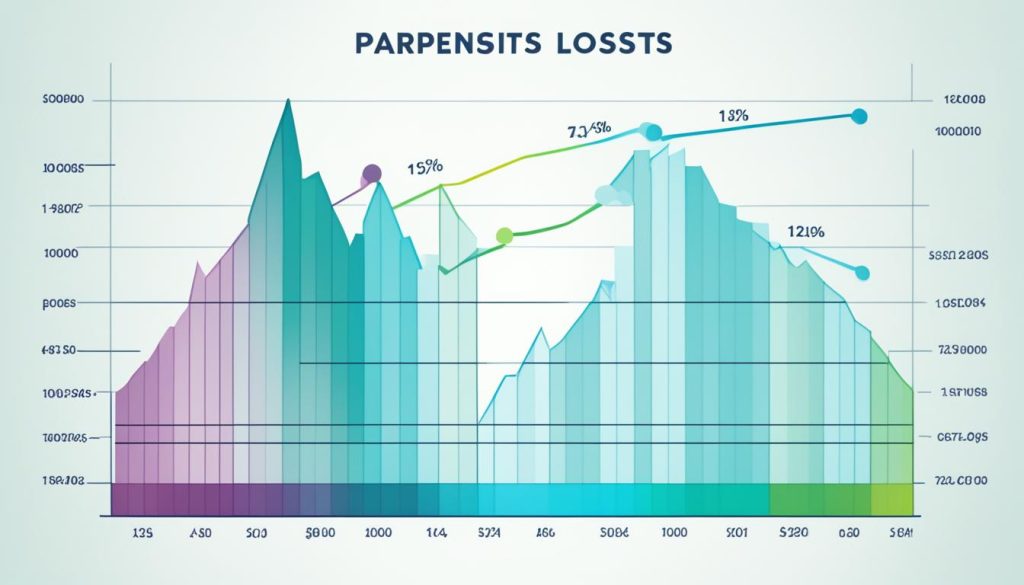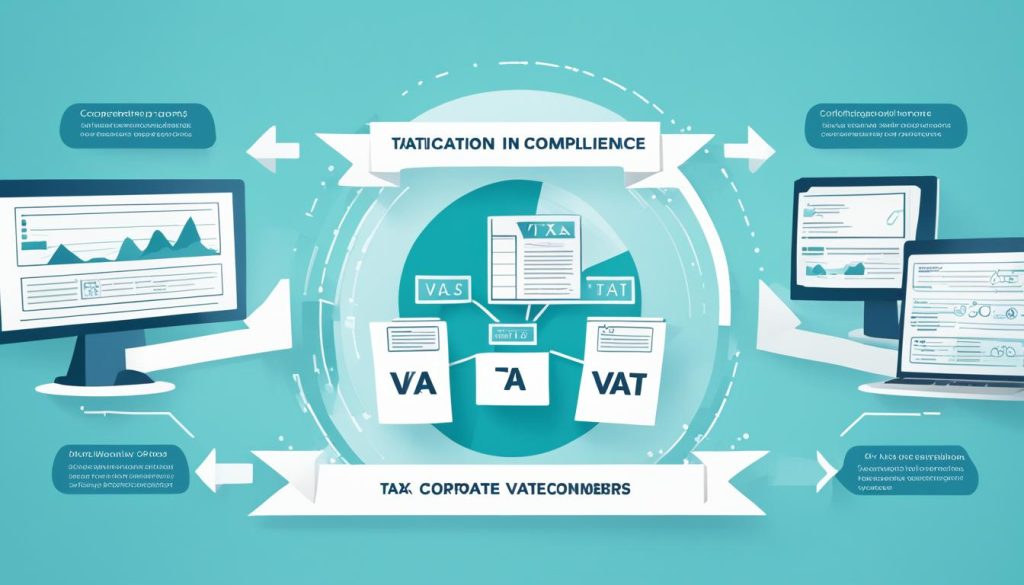German tax law can seem scary at first, but it’s important for businesses in Germany to get it. This includes knowing about VAT, CIT, and Trade Tax. These taxes are charged at different levels in Germany, which can make things complicated. For companies within Germany, the tax rules could be different compared to those from outside the country.
- Overview of the German Tax System
- Corporate Income Tax (CIT) in Germany
- Value-added Tax (VAT) Rules and Procedures
- Adherence to Corporate Taxation Germany Mandates
- Legal Entities and Tax Implications
- Special Considerations for Partnerships
- Cross-border Taxation Within the EU
- Tax Compliance in Cross-Border Trade with Non-EU Countries
- VAT Identification and Reporting Requirements
- German Tax Authority and Judicial System
- Tax Filing Procedures for Corporations
- Utilisation of Tax Losses in Germany
- Withholding Tax on Dividends and Other Payments
- Understanding the Solidarity Surcharge
- Special Tax Rules for Real Estate Transactions
- Indirect Taxes and Their Impact on Businesses
- Best Practices for Ensuring Compliance
- Source Links
Corporations with a base in Germany have to follow all rules. This ensures their business runs smoothly without any tax troubles.
Key Takeaways
- Understanding German tax law is critical for corporate entities.
- Corporations must comply with various tax obligations such as VAT, CIT, and Trade Tax.
- Taxes are imposed at federal, state, and municipal levels.
- Businesses with registered seats or places of management in Germany face unlimited tax liability.
- Non-residents have limited tax liability.
Overview of the German Tax System
The German tax system is complex, with rules from different authorities. It covers taxes at federal, state, and local levels. This lets Germany keep a strong grip on tax compliance. Businesses in Germany need to be aware of all these rules to pay their taxes correctly.
Basic Structure and Jurisdictions
Germany’s tax system includes the federal government, 16 states, and many local areas. They all collect taxes. This makes sure businesses pay their share to the country and its cities.
Types of Taxes Imposed on Corporations
In Germany, businesses deal with several kinds of taxes. These include CIT, VAT, and TT. Each tax has its own rules and aims at different parts of a business’s income and activities. They affect how much tax a business has to pay.
Where a business is registered and how it’s managed can affect its tax status. This means companies need strong plans to manage their taxes well.
Corporate Income Tax (CIT) in Germany
It’s important for businesses in Germany to understand Corporate Income Tax (CIT). The tax system there is meant to be fair for all. It affects how companies manage their money.
Businesses in Germany deal with several taxes. These include CIT rates, solidarity surcharges, and trade taxes. The amounts may change from place to place.
Statutory CIT Rate
The CIT rate everyone follows is 15% in Germany. It applies to all companies there. This rate helps companies support the economy and stay competitive worldwide.
Solidarity Surcharge
On top of the CIT rate, companies pay a solidarity surcharge of 5.5%. This makes the total tax rate 15.825%. The surcharge’s purpose is to help specific German areas grow. It’s a vital part of the tax system.
Trade Tax (TT) and Municipal Multipliers
The trade tax (TT) is set by local areas in Germany. It ranges from 7% to 17% because of these different multipliers. The local government decides the multiplier.
A company’s final tax is a mix of CIT and TT. The location of the company in Germany impacts this total tax. So, it varies for each city.
Understanding the CIT, solidarity surcharge, and TT is key for financial planning. Following these rules helps companies work smoothly in Germany’s tax system.
Value-added Tax (VAT) Rules and Procedures
Being VAT compliance in Germany is crucial for businesses. They should apply the 19% standard rate or 7% for specific items.
Businesses must invoice correctly with these rates. They also have to do regular VAT returns. This helps them keep up with the VAT rules and makes managing VAT easier.
For trade within the EU, companies need to follow special tax rules. This includes the reverse charge procedure. Doing this right ensures they trade smoothly across borders.
Adherence to Corporate Taxation Germany Mandates
It’s crucial for companies in Germany to follow the tax rules. Doing so helps them avoid fines and keeps their business smooth. They must make sure they pay their taxes correctly and on time.
Corporate Income Tax Compliance
Managing German corporate tax starts by filing correctly and paying the taxes due. This means submitting an income tax return each year. Companies must report their earnings accurately. They should also keep up-to-date with tax law changes and maintain precise records for their tax filings.
Trade Tax Compliance
To calculate trade tax, companies consider their location’s tax rules. Each region might have different trade tax laws. By complying, they avoid legal trouble. Getting advice from tax experts helps companies follow these rules effectively.
Legal Entities and Tax Implications
Knowing the tax effects of different business forms in Germany is key. The way corporations and partnerships are taxed differs a lot. This affects how they plan their finances.
Corporations vs Partnerships
Corporations in Germany handle their taxes within the company. They must pay Corporate Income Tax (CIT) and Trade Tax (TT). This setup is called non-transparent taxation.
Partnerships, however, are taxed transparently. Their profit goes to the owners directly, who then include it in their personal tax. This could affect your choice between running your business as a corporation or a partnership.
Transparent vs Non-Transparent Entities
Knowing if your business is seen as transparent or non-transparent is crucial for tax planning. Partnerships prepare special financial reports to show how income is shared.
Corporations, seen as non-transparent, are taxed at their own level. They deal with various corporate taxes. This, at times, makes their tax rate higher. So, picking the right business structure is critical for tax efficiency in Germany.
Special Considerations for Partnerships
Understanding the taxation of partnerships in Germany involves some key points. Mainly, the way profits are shared among partners is vital. Each partner pays tax on their share of the profits. This makes it necessary to calculate each partner’s tax fairly under German tax law for partnerships.
Partnerships also face trade tax duties. These taxes are based on what the partnership does. Although it means more work, handling these obligations is crucial for following German tax law for partnerships correctly.
Additionally, there are specific rules on carrying forward tax losses. Partnerships need to watch out for any limits on this. Changes in who owns the partnership can also affect using these tax losses. By planning ahead and doing accurate calculations, partnerships can deal with their taxes well.
Cross-border Taxation Within the EU
Managing taxes in the EU when trading between countries is key. Businesses moving goods between EU nations need to follow special tax rules. This is to make sure they pay the right taxes and don’t get fined.
Acquisition Tax
When goods move from one EU country to another, an acquisition tax applies. The buyer pays this tax. Where the buyer is based affects how much tax they pay. Documenting purchases accurately and paying the tax on time is vital for these businesses.
Reverse Charge Procedure
The reverse charge system aims to make handling VAT easier in B2B sales. It means the buyer, not the seller, deals with the VAT payment. This helps to make operations smoother and lessens the chance of fraud. Businesses need to know and use this system well for good tax management.
Tax Compliance in Cross-Border Trade with Non-EU Countries
In cross-border trade with non-EU nations, businesses face several tax duties. They must follow these to ensure they’re paying the right amount of taxes. One big task is to handle the import turnover tax. This tax, much like VAT, is paid to customs when goods are imported. The good news is, it can be taken back as input tax if all the paperwork is correct.
Knowing about customs regulations is key for smooth trade with other countries. Getting the right tariff classification and valuing the goods correctly is crucial. Following proper import steps is also important. Doing these things right helps businesses follow the rules, avoid delays, and cut down on extra costs.
For businesses sending goods to non-EU places, there’s a plus point. These exports don’t have to pay VAT, which can save money. But, meeting strict rules on international sales is a must. Companies need to keep full and accurate records. They must also do all the official steps correctly.
To make everything work, businesses need to fully understand their non-EU trade tax duties. They must also make sure to obey the customs regulations. Managing the import turnover tax well is essential. This will help in smoother global deals and in benefiting from VAT on exports. Being alert and ready to solve tax matters can really help a company do better in international business. It can also prevent any legal issues.
VAT Identification and Reporting Requirements
It’s key for companies in the EU to understand German VAT rules for cross-border trade. They must get a VAT number. This number makes trading easier and keeps them in line with tax rules.
How to Obtain a VAT Identification Number
Getting a VAT number in Germany is simple. Companies apply online at the German Federal Tax Office. They just need to give some basic business info. Once they get the number, trading across borders goes smoothly and they can follow VAT rules well.
Periodic VAT Reporting
Companies in Germany use the ELSTER system to report VAT. They should do this monthly or quarterly depending on their sales. Reporting regularly helps businesses stay on top of their tax records and meet rules. This way, they can avoid fines and keep their finances straight.
German Tax Authority and Judicial System
Germany’s tax system is known for its strong setup. It has several levels of governance, from federal to local. This setup helps manage taxes well. Different German taxation agencies work within clear laws.
The legal framework for taxes in Germany is based on civil law. It uses many tax laws and rules to make sure taxes are fair. These laws aim to make the tax system clear and build trust between people and the government.
In tax disputes, special courts for taxes are very important. They help solve cases smoothly. These courts look into issues with tax calculations and how taxes are followed. People can appeal tax rulings they disagree with.
At the top is the Federal Tax Court (BFH) in Germany. It is the highest court for tax arguments. The BFH is key in making sure tax laws are applied the same way for everyone. This system helps keep tax laws fair and protects people’s rights.
Tax Filing Procedures for Corporations
In Germany, corporations must stick to specific tax filing rules. This ensures they follow the law. They need to file taxes online and know what they must submit each year and at other times.
Online Tax Filing Systems
Germany says companies must file their taxes online. They use ELSTER to do this. ELSTER helps make tax e-filing easy, safe, and correct. This way, companies meet the tax rules.
Annual Returns and Periodic Submissions
All companies must do an annual tax return. It shows what they earned and the taxes they owe. Also, they must send in other tax forms regularly. This includes VAT reports monthly or quarterly. Doing this right keeps companies in line with tax laws.
Utilisation of Tax Losses in Germany
In Germany, corporate entities and partnerships can lower their taxes using tax loss utilisation. Knowing how to work within these laws is key for managing money well.
Carrying Forward and Backward of Tax Losses
Tax losses can be carried forward forever in Germany. This helps businesses lessen taxes on future profits. Yet, they must pay some tax, with 60% being the max they can offset.
If a company makes a loss, it can sometimes move it back to the year before. This is not as broad as carrying forward. However, it helps when a business faces ups and downs in earnings. These rules work for both income and trade taxes, highlighting the need for unique financial plans for each kind of tax.
- Carry forward losses are indefinite but governed by minimum taxation rules.
- Carry backward provisions are more restricted but useful for smoothing income fluctuations.
Withholding Tax on Dividends and Other Payments
In Germany, when companies pay out dividends to their shareholders, they take off 25% as a withholding tax. Then, there’s an extra fee, called a solidarity surcharge, on top of that. This fee helps fund important projects and fix the country’s infrastructure.
Standard Withholding Rates
The standard withholding rate of 25% on dividends aims to make sure non-German shareholders pay their fair share of taxes. It might change due to laws or the economy. Anyone getting these dividends must know they’ll get taxed at this rate.
Impact of Double Taxation Treaties
But there’s a silver lining for shareholders from other countries. Germany has made deals with lots of nations to lessen the tax burden on foreign investors. Thanks to these double taxation agreements, investors might pay less tax, or even get some money back. This helps make investing in Germany more attractive and fair.
This system also makes things simpler for foreign investors. Depending on where they live, they can either get their withholding tax reduced from their final tax bill or see it as a one-off payment. This friendly approach encourages more investing in Germany, all while keeping the country’s tax laws in check.
Understanding the Solidarity Surcharge
In Germany, the solidarity surcharge is key for taxpayers. It was first put in place to help cover the costs of the country’s reunification. It affects both companies and individuals paying tax. This extra charge has a big impact on how much tax many Germans pay.
Who Pays the Solidarity Surcharge?
If you live in Germany and earn more than €62,809 a year, or if you own a company, the solidarity surcharge applies to you. This rule is quite broad, covering a lot of people and businesses. Companies pay a 5.5% extra on their Corporate Income Tax (CIT), influencing their total tax bill.
Recent Changes and Implications
Lately, changes have been made to the solidarity surcharge. The amount you can earn before needing to pay it has gone up, meaning fewer individuals need to worry about it. But, this levy still affects companies. These changes aim to make the tax system fairer and keep the surcharge’s goals on track. For companies, considering this surcharge when planning their taxes is vital for managing their costs effectively.
Special Tax Rules for Real Estate Transactions
In Germany, real estate dealings face special tax rules. Corporations need to understand these rules well. They should pay attention to the Real Estate Transfer Tax (RETT). This tax is on the sale or transfer of property. Knowing and following these laws will help companies stay out of trouble.
Real Estate Transfer Tax (RETT) Rates
Real estate taxes in Germany change from state to state. The Real Estate Transfer Tax (RETT) can be from 3.5% to 6.5%. Each state decides its own rate. This means companies must always check what rate they should pay.
Legal Obligations for Corporations
Corporations must follow specific rules when dealing in real estate. They have to file documents and pay the RETT on time. Not following these rules can lead to fines. It’s important for businesses to know all about real estate taxes. Talking to tax experts and planning well can make things easier.
Indirect Taxes and Their Impact on Businesses
Managing indirect taxes is vital in Germany for tax strategies to work well. Taxes such as VAT and real estate transaction taxes are key. They shape how much money companies make and spend. VAT is charged on services and goods. RETT is important when dealing with properties.
Firms must be careful with VAT to set the right prices and keep costs in line. It’s key to making profits. However, RETT can add extra expenses. Companies need to handle this well to avoid money troubles.
Understanding German indirect taxes is a must for businesses. Good management means companies follow the rules and do well financially. Thinking smartly about these taxes boosts a company’s tax performance. This way, companies can compete and obey laws in the ever-changing German business world.
Best Practices for Ensuring Compliance
Staying compliant with German tax laws is complex but critical for businesses. It requires being aware of regulations, keeping precise records, and using technology efficiently. Knowledge on tax law updates is key, as Germany’s tax structure is detailed and changes often. It is vital for companies to learn about new rules regularly to prevent mistakes and fines.
Meeting tax filing deadlines is vital. For this, Germany has ELSTER, an electronic tax system that makes filing easier and ensures you file on time. It also helps in keeping your tax information organised for different types of taxes, like CIT, VAT, and TT.
Good record-keeping is essential too. Clear financial records make filing accurate tax returns and facing audits smoother. Having regular internal audits, working with tax experts, and using accounting software can help. These steps assist in following tax rules fully, reducing risk, and navigating the tax system safely.


















